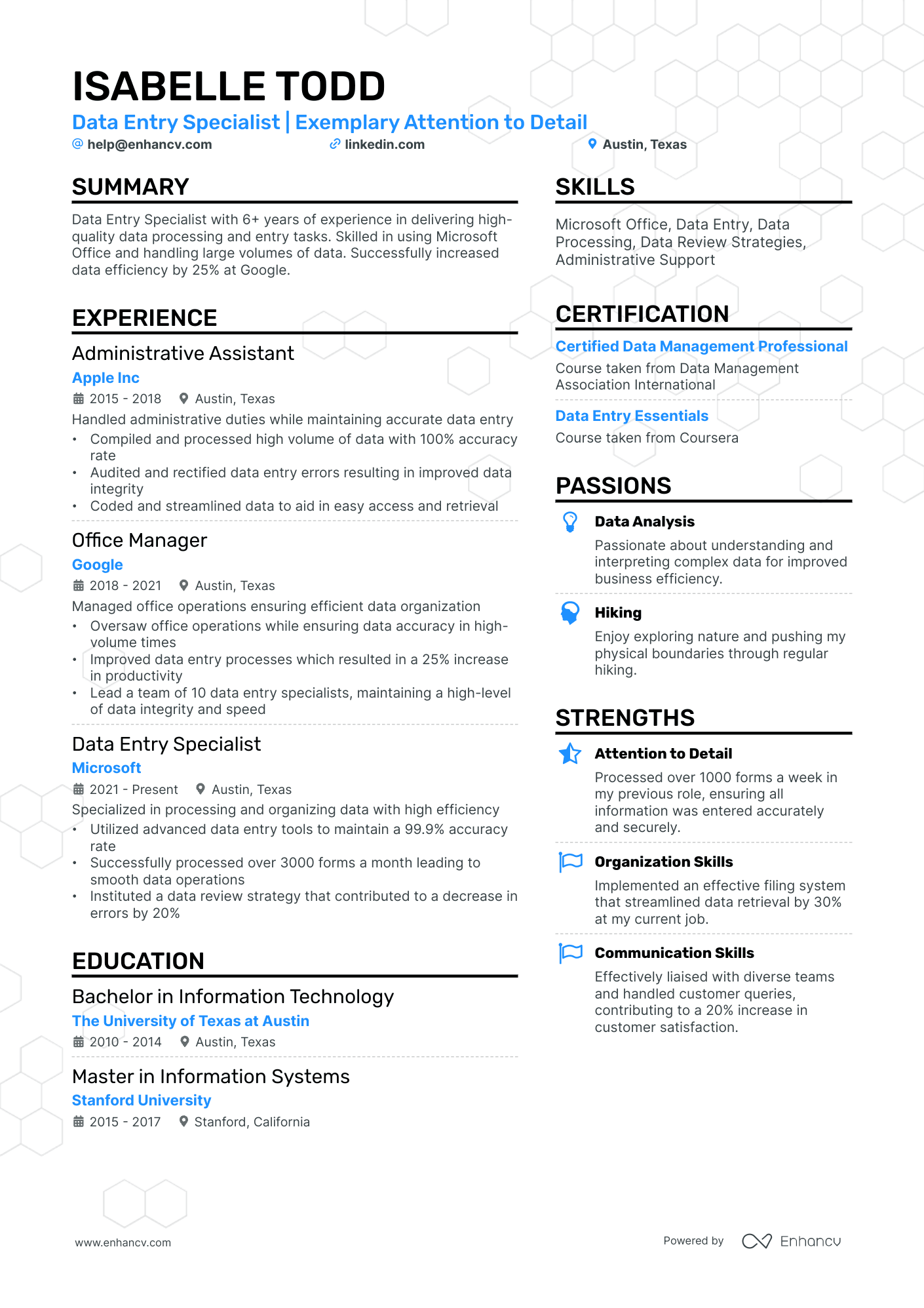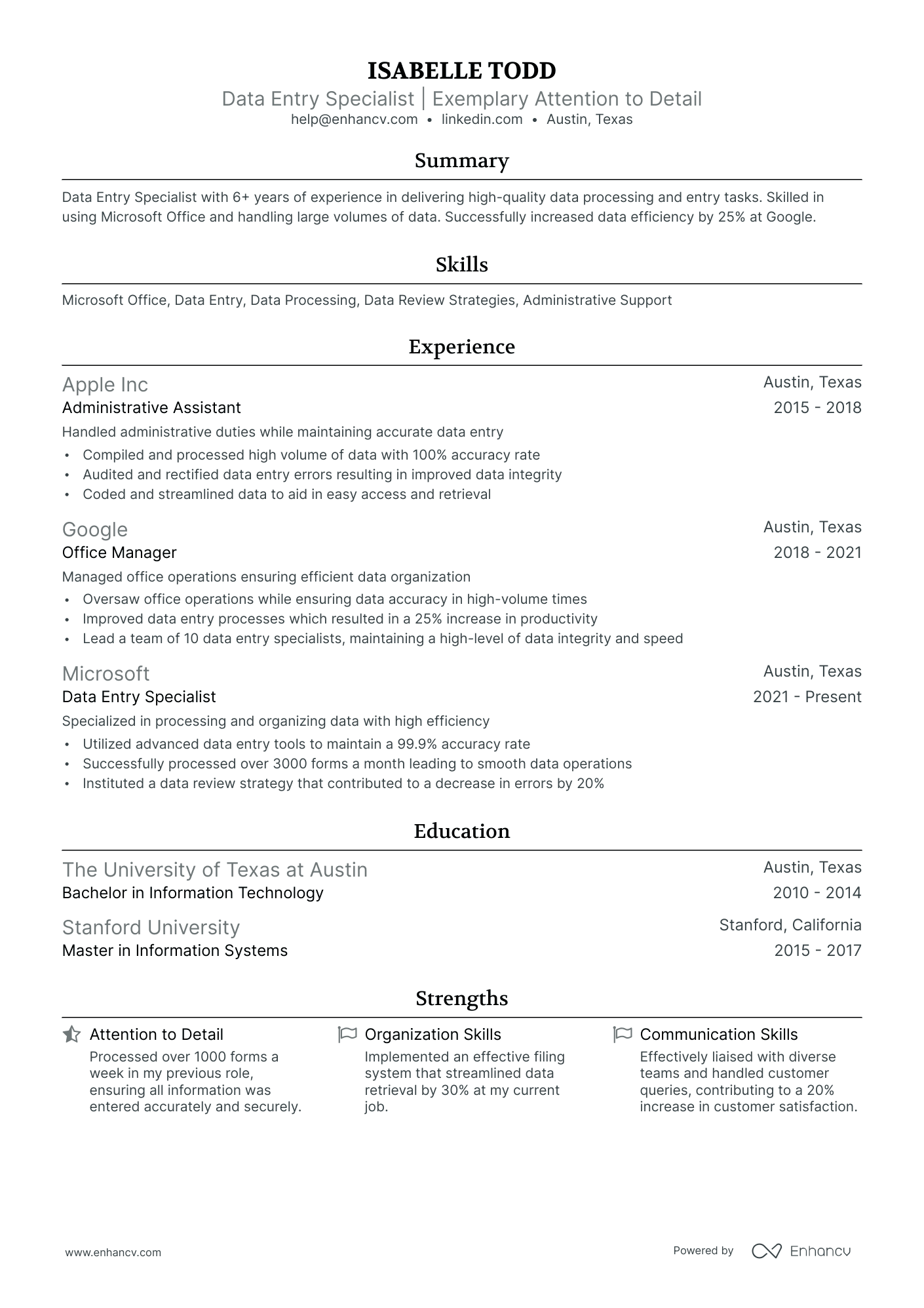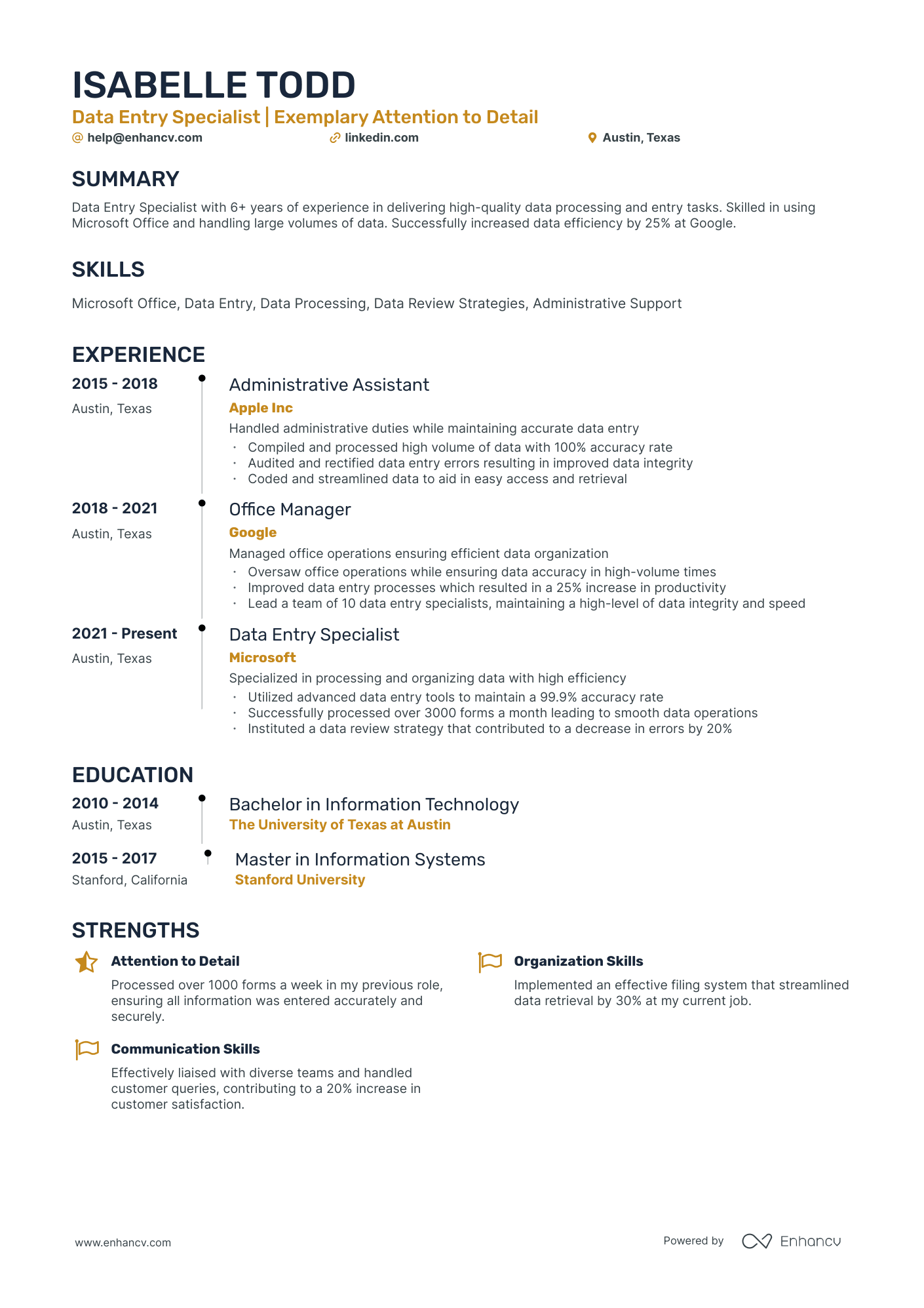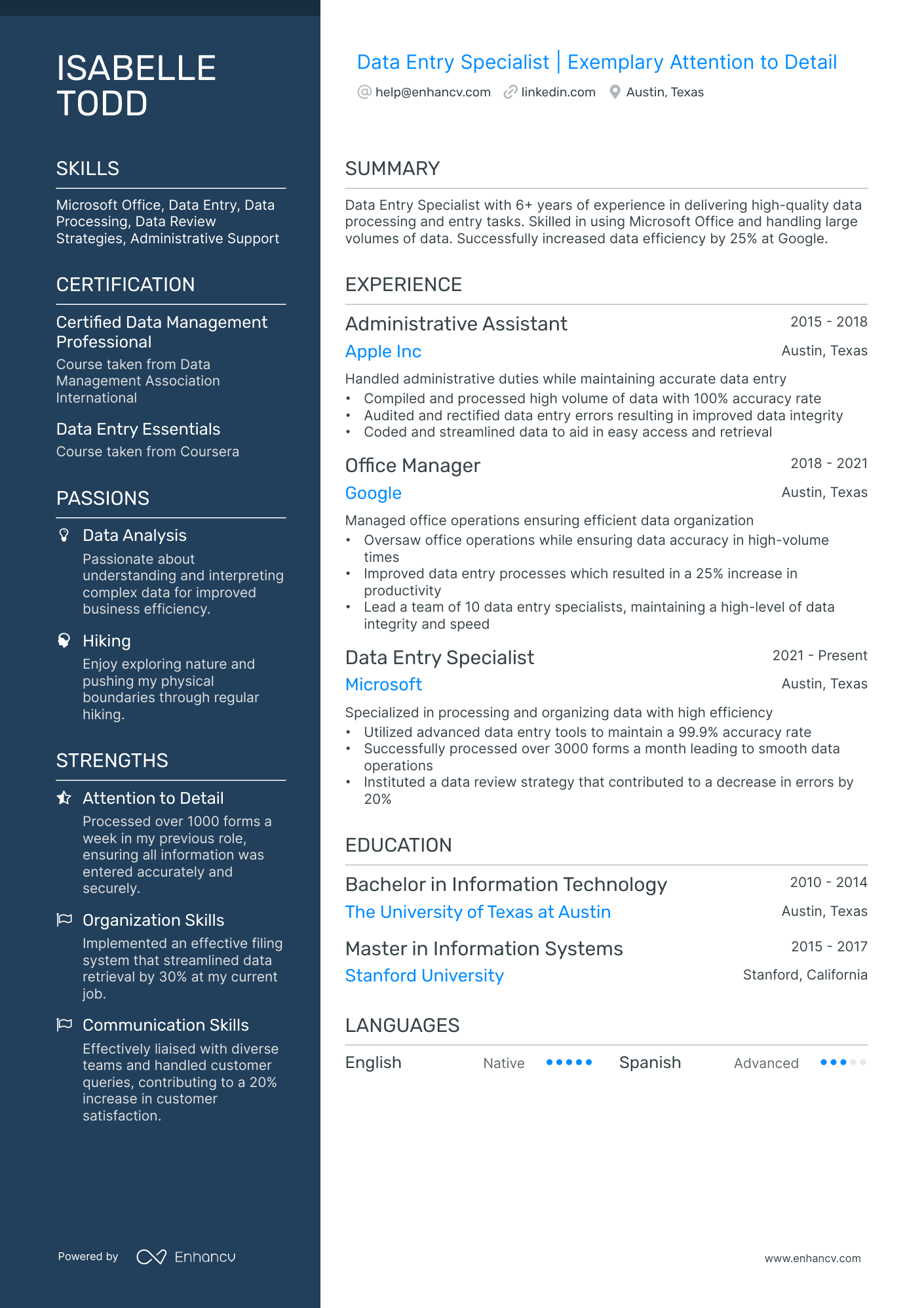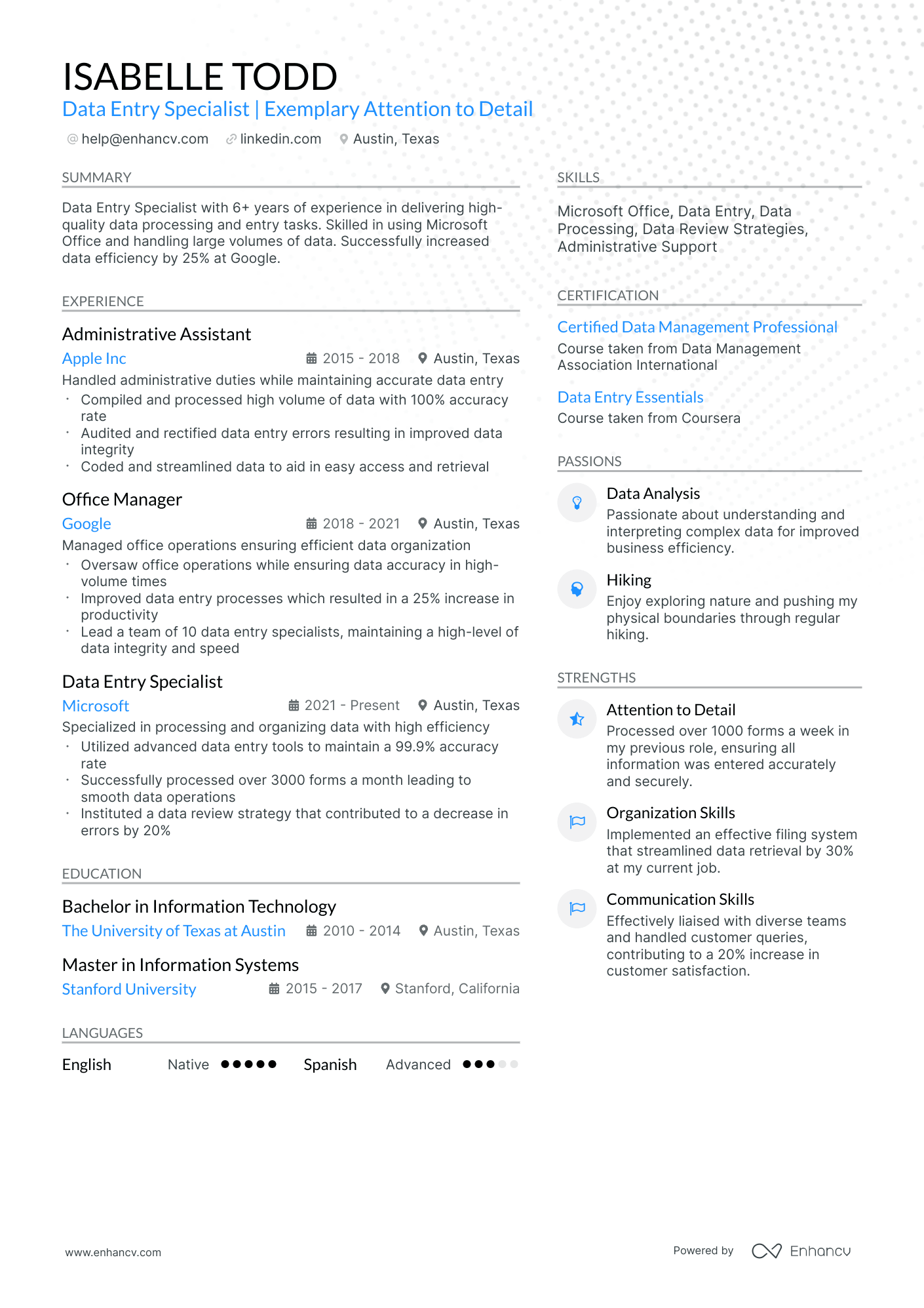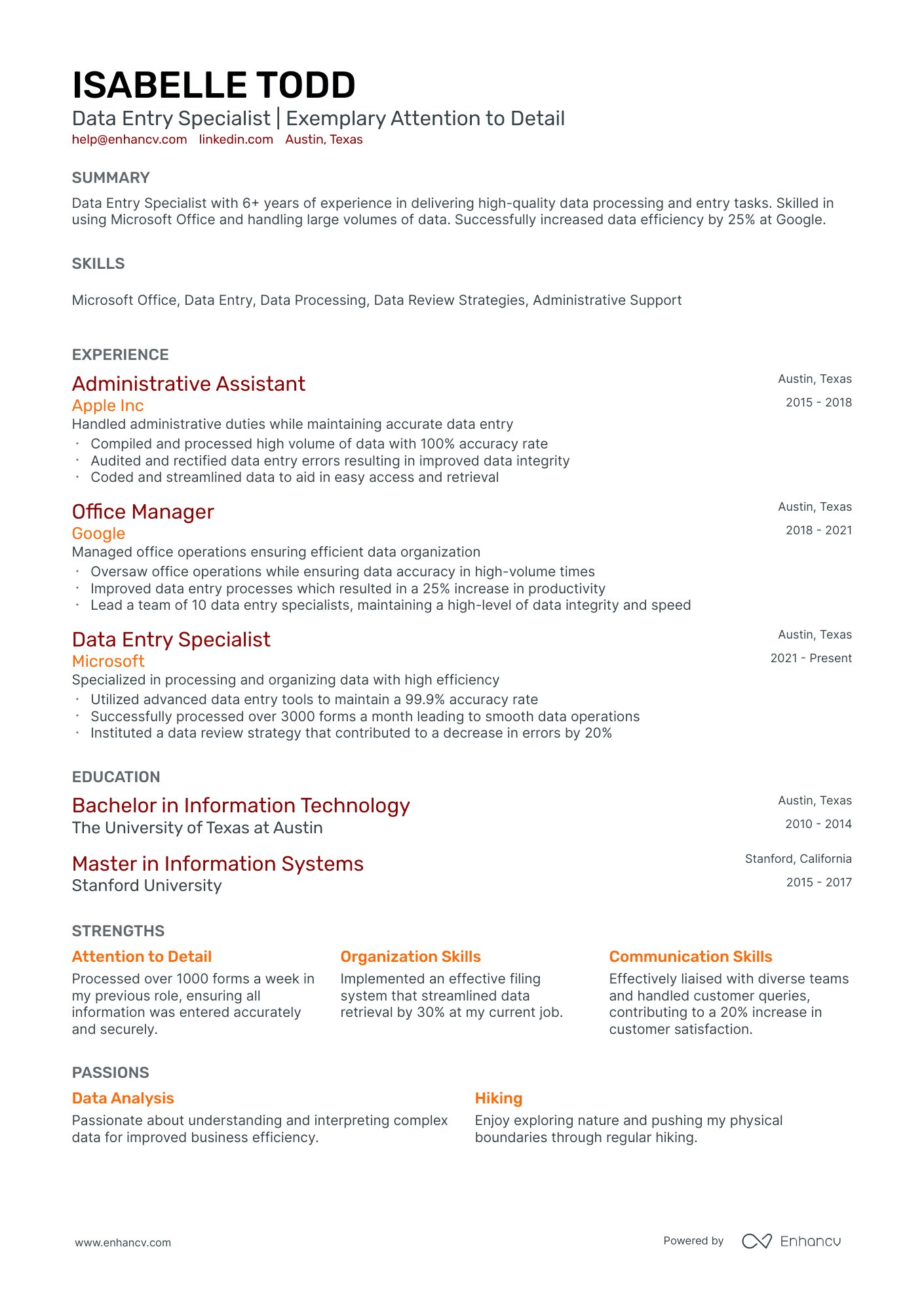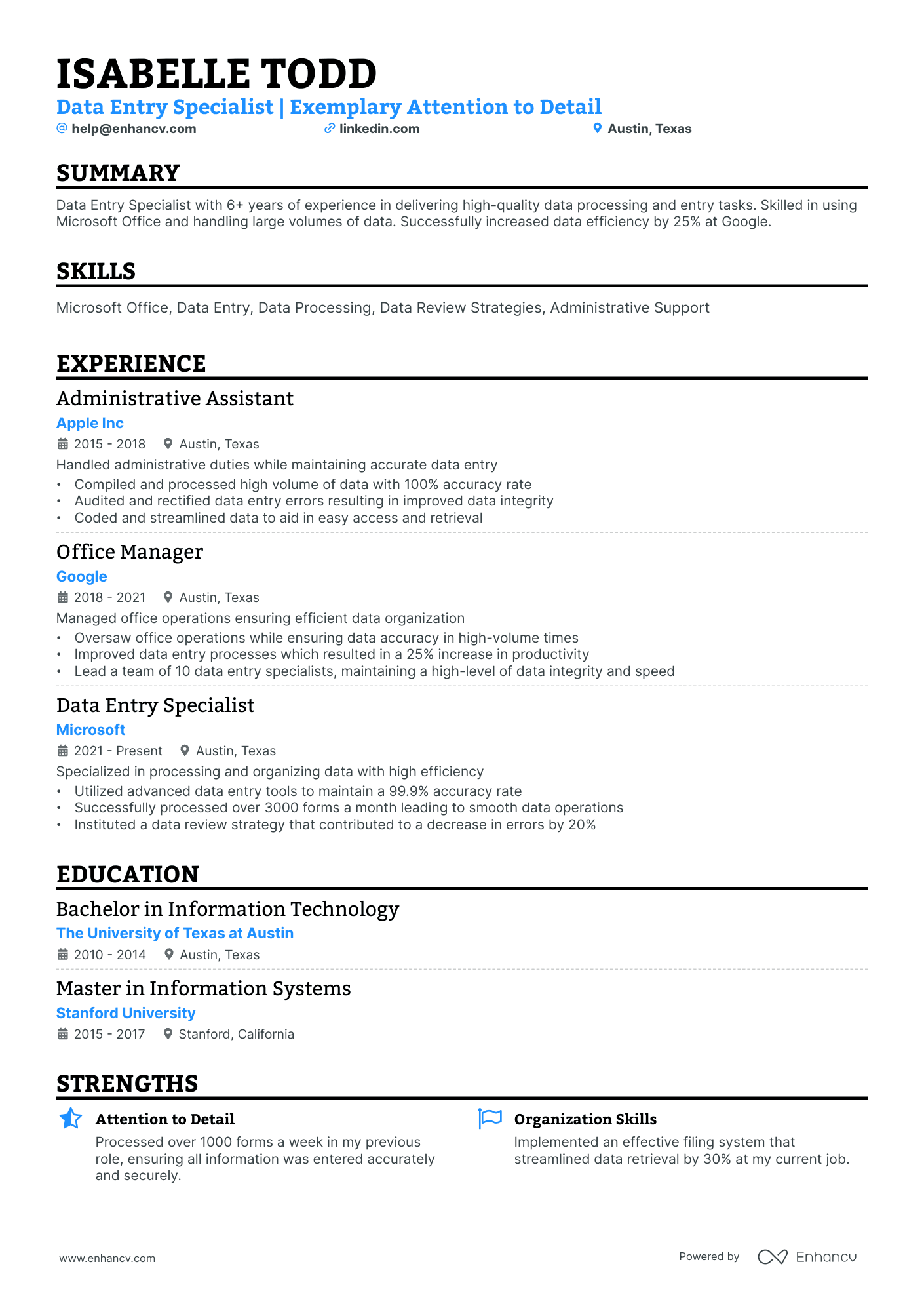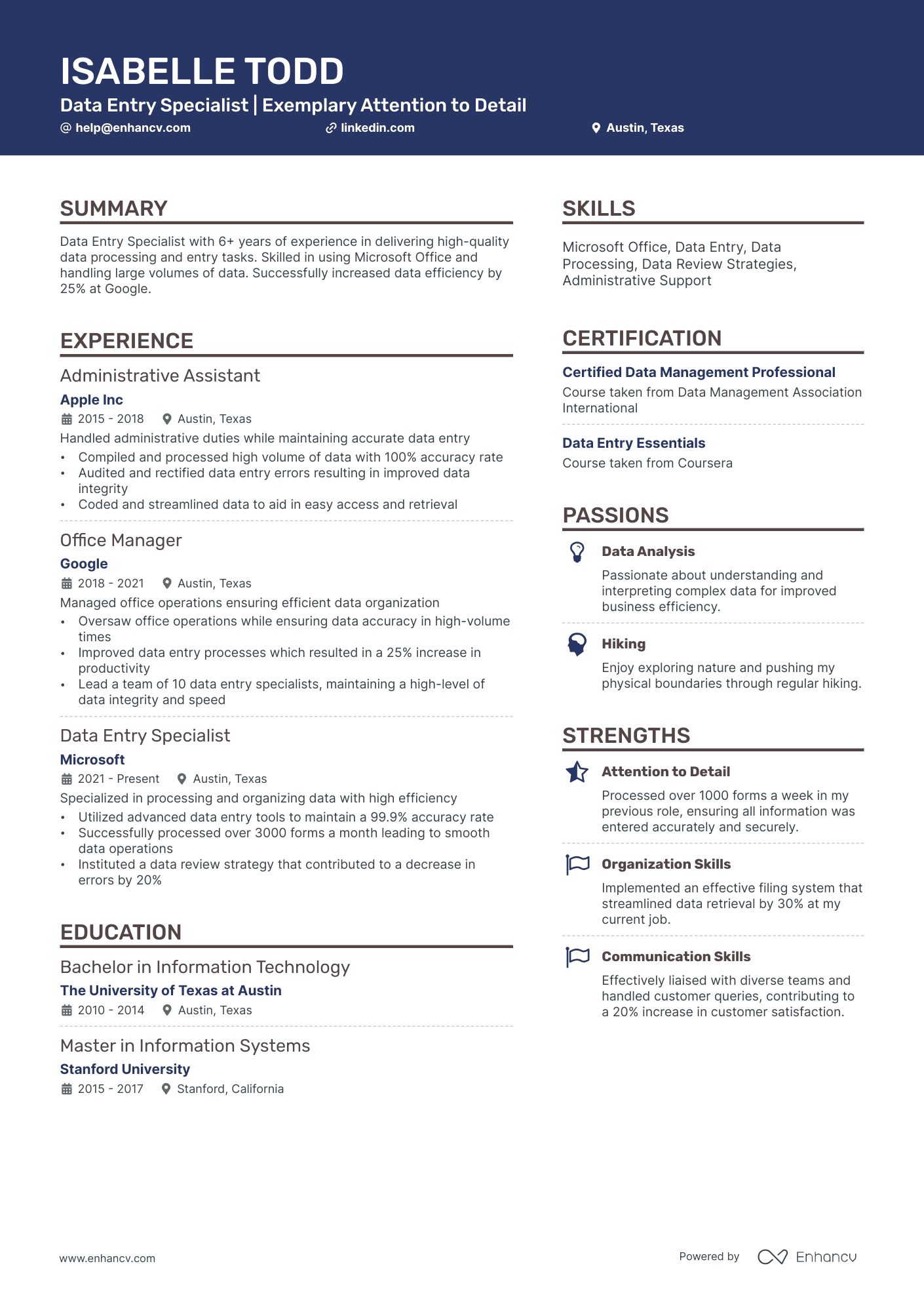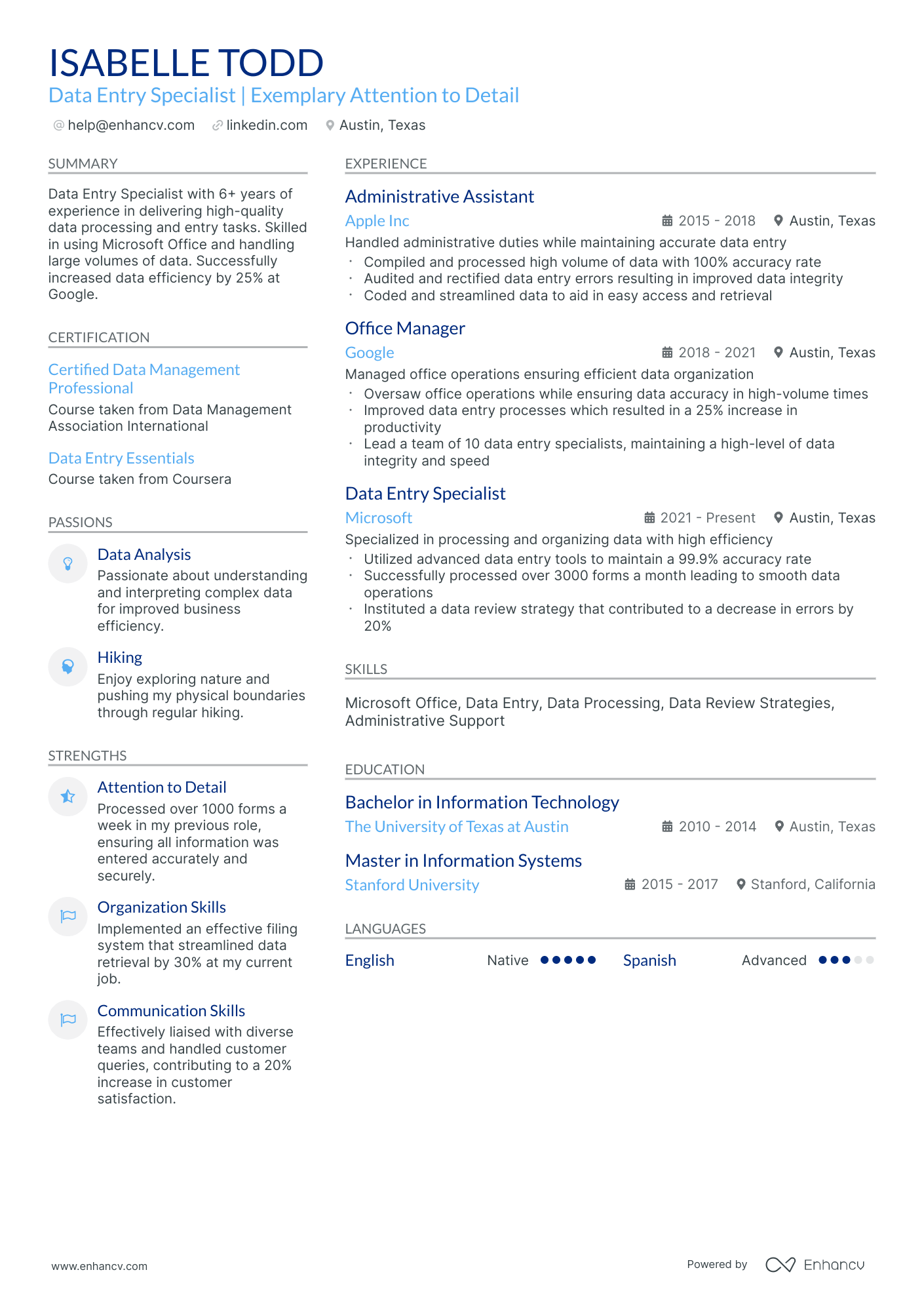One significant resume challenge faced by data entry specialists is showcasing their technical skills and attention to detail in a way that stands out amidst a sea of similar candidates. Our guide can help address this issue by providing specific tips on how to effectively highlight these abilities, using powerful action verbs and quantifiable achievements that demonstrate your proficiency and impact in previous roles.
Our data entry specialist guide will help you perfect your resume by explaining you how to:
- Alight your data entry specialist resume with the role you're applying for ensuring it will be read by the applicant tracking system.
- Tailor your specific data entry specialist experience to get the attention of recruiters.
- List your relevant education to impress hiring managers.
- Discover job-winning data entry specialist professional resume examples to inspire writing yours.
Recommended reads:
Demystifying the data entry specialist resume format
While a touch of creativity can be appealing, it's the clarity and relevance of your data entry specialist resume format that truly resonates with recruiters.
To ensure your resume not only captures attention but also maintains it, consider these four streamlined steps:
- If your career boasts a wealth of pertinent and recent accomplishments, the reverse-chronological resume format is your ally. It naturally emphasizes your experience, placing your most recent roles at the forefront.
- Design a straightforward header: incorporate your contact information, a headline reflecting the position you're vying for or your current designation, and a link to your professional portfolio.
- While brevity is key, if you're targeting a senior position or have accumulated over ten years of industry-relevant experience, extending your resume to two pages is permissible.
- To ensure consistent formatting across various platforms, always save and submit your data entry specialist resume as a PDF.
Each market has its own resume standards – a Canadian resume layout may differ, for example.
Upload your resume
Drop your resume here or choose a file. PDF & DOCX only. Max 2MB file size.
Pro tip
Make sure your resume is ATS compliant and catches the recruiters' attention by tailoring your experience to the specific job requirements. Quantify and highlight why you're the best candidate for the role on the first page of your resume.
Essential components for your data analytics manager resume:
- Header: Feature your name prominently. If you have a notable degree or certification, append it next to your name. Include contact details, a link to your portfolio, and a concise headline.
- Summary or Objective: Align your professional trajectory and standout achievements with the desired role.
- Experience: Craft concise bullet points, highlighting tangible successes and contributions.
- Skills: Showcase them throughout your resume and consider a dedicated sidebar for emphasis.
- Education & Certifications: Reinforce your credibility and demonstrate your commitment to the industry.
What recruiters want to see on your resume:
- Proficiency in data entry software and tools, such as Microsoft Office Suite and database applications
- High accuracy and speed in typing and data input, often measured in keystrokes per hour (KPH)
- Experience in maintaining digital filing systems and performing data backups
- Demonstrated ability to work with confidential or sensitive information responsibly
- Evidence of strong attention to detail and organizational skills
Recommended reads:
Designing your data entry specialist resume experience to grab recruiters' attention
For the data entry specialist position, it's crucial to show how your expertise matches what they're looking for.
Your resume experience section can be a game-changer. Ensure you:
- Feature roles most relevant to the data entry specialist job you're targeting.
- Avoid diving too deep into ancient history - unless what you did a decade ago is super relevant to the data entry specialist role.
- Structure each bullet to first describe what you did, followed by the skills you utilized, and then the impact of your efforts.
- Quantify your achievements with numbers, possibly highlighting the broader impact on the organization.
- Emphasize transferable skills - those you've gained in past roles that could be valuable in your new role. This showcases your unique professional value.
Crafting the experience section doesn't mean detailing every job you've ever had. Check out the data entry specialist resume samples below to see how top professionals present their experience.
- Performed accurate data entry tasks, processing an average of 500 records per day with a 99% error-free rate.
- Developed and implemented an automated data verification system, reducing manual checking time by 50%.
- Collaborated with cross-functional teams to streamline data collection processes, resulting in improved efficiency.
- Maintained confidentiality and data integrity while handling sensitive information.
- Assisted in data analysis projects by organizing and categorizing large datasets for further analysis.
- Managed high-volume data entry tasks, ensuring timely completion and accuracy of over 1000 records daily.
- Implemented data quality control measures, resulting in a 30% reduction in errors.
- Coordinated with the IT department to integrate new data entry software, improving overall efficiency by 20%.
- Assisted in the development of standardized data entry procedures and trained new team members.
- Conducted regular data audits to identify discrepancies and resolved them promptly.
- Performed data entry and validation tasks for a diverse range of databases, including financial and customer information.
- Identified and resolved inconsistencies in data sets, ensuring data accuracy and reliability.
- Utilized advanced Excel functions to manipulate and analyze data, providing valuable insights for decision-making.
- Maintained data confidentiality in compliance with industry regulations and company policies.
- Collaborated with the IT team to troubleshoot system issues and optimize data entry procedures.
- Entered and verified data from various sources, including paper documents and digital records.
- Assisted in the migration of legacy systems to a new data management platform, ensuring seamless transition.
- Supported the data analysis team by generating reports and extracting relevant information from complex datasets.
- Identified opportunities for process improvement and implemented time-saving strategies, resulting in a 15% increase in productivity.
- Maintained a meticulous approach to data entry, ensuring accuracy and completeness of records.
- Handle large-scale data migration projects, transferring and validating over 10,000 records across multiple databases.
- Developed macros and automated scripts using VBA to expedite data entry tasks and minimize errors.
- Collaborated with the development team to enhance the user interface of the data entry software for improved usability.
- Conducted thorough data analysis to identify trends and patterns, supporting strategic decision-making processes.
- Provided training and support to junior data entry specialists, ensuring adherence to quality standards.
- Managed a team of data entry specialists, overseeing their work and ensuring accuracy and timeliness.
- Implemented data cleansing procedures to eliminate duplicate and erroneous records, improving overall data quality by 25%.
- Developed customized data entry forms and templates to streamline the data collection process.
- Assisted in the integration of new software applications, optimizing data entry workflows and reducing processing time by 30%.
- Collaborated with IT support to troubleshoot system issues and resolve data entry-related discrepancies.
- Handled confidential and sensitive data with utmost professionalism and maintained strict data privacy standards.
- Contributed to the development of an efficient data entry system, resulting in a 40% reduction in processing time.
- Performed regular data quality checks and resolved discrepancies, ensuring data accuracy and integrity.
- Collaborated with cross-functional teams to gather and validate data for specific research projects.
- Assisted in the creation of comprehensive reports and visualizations based on analyzed data.
- Entered and verified data with high accuracy and attention to detail, exceeding productivity targets consistently.
- Organized and maintained large databases, ensuring easy access and retrieval of information.
- Provided customer support, resolving data-related inquiries and offering guidance on proper data submission.
- Collaborated with the IT department to automate data entry processes, reducing manual effort and improving efficiency.
- Conducted data audits and implemented corrective measures to enhance data quality.
- Utilize advanced OCR technology to extract data from scanned documents, reducing manual entry by 70%.
- Perform regular data validation checks to ensure accuracy and completeness of entered information.
- Collaborate with cross-functional teams to identify opportunities for process improvement and implement streamlined data entry procedures.
- Assist in the development and maintenance of a centralized database for efficient data management.
- Provide training and support to colleagues on data entry best practices and usage of data management tools.
- Entered data into company-specific software systems, following established protocols for consistency and accuracy.
- Performed regular data backups and ensured the integrity and security of stored information.
- Coordinated with team members to handle high-volume data entry tasks during peak periods, meeting tight deadlines.
- Generated productivity reports and analyzed data trends to identify areas for improvement.
- Assisted in the implementation of data entry automation tools, reducing manual effort and increasing efficiency.
The following content includes information from "O*NET OnLine" by the U.S. Department of Labor, Employment and Training Administration (USDOL/ETA). Used under the CC BY 4.0 license. The data represents the top responsibilities present on the task lists for data entry specialist professionals.
Top Responsibilities for Data Entry Specialist:
- Locate and correct data entry errors, or report them to supervisors.
- Compile, sort, and verify the accuracy of data before it is entered.
- Compare data with source documents, or re-enter data in verification format to detect errors.
- Store completed documents in appropriate locations.
- Select materials needed to complete work assignments.
- Read source documents such as canceled checks, sales reports, or bills, and enter data in specific data fields or onto tapes or disks for subsequent entry, using keyboards or scanners.
- Maintain logs of activities and completed work.
- Load machines with required input or output media, such as paper, cards, disks, tape, or Braille media.
- Resolve garbled or indecipherable messages, using cryptographic procedures and equipment.
Quantifying impact on your resume
<ul>
Addressing a lack of relevant data entry specialist experience
Even if you lack direct data entry specialist experience, you can still craft a compelling resume. Here's how:
- Highlight projects or publications that demonstrate your relevant skills or knowledge.
- Emphasize transferable skills, showcasing your adaptability and eagerness to learn.
- In your objective, outline your career aspirations and how they align with the company's goals.
- Consider a functional or hybrid resume format, focusing on skills over chronological experience.
Recommended reads:
Pro tip
If your experience section doesn't directly address the job's requirements, think laterally. Highlight industry-relevant awards or positive feedback to underscore your potential.
Essential data entry specialist resume skills
When recruiters review data entry specialist resumes, they're looking for a mix of technical know-how and personal attributes.
Technical skills demonstrate your proficiency in specific tools or tasks. They indicate if you're ready to jump into the role or if you'll need extensive training.
On the other hand, soft skills reflect your interpersonal abilities. They show how you'll fit into a team or company culture.
To effectively present these skills on your resume:
- Design a skills section that highlights both your technical and interpersonal strengths.
- Provide examples where you've applied these skills, such as projects or tasks.
- For soft skills, describe situations where they've been crucial to your success.
- Use metrics, like improved efficiency or positive feedback, to validate your skills.
For inspiration, explore the preferred skills of leading data entry specialist professionals.
Top skills for your data entry specialist resume:
Microsoft Excel
Google Sheets
Data Management Software
CRM Software
Database Entry Systems
Data Validation Tools
Typing Proficiency
Optical Character Recognition (OCR) Software
Spreadsheet Formulas
Data Backup and Recovery Tools
Attention to Detail
Time Management
Organizational Skills
Communication Skills
Problem-Solving
Adaptability
Team Collaboration
Multitasking
Critical Thinking
Customer Service Orientation
Next, you will find information on the top technologies for data entry specialist professonals from "O*NET OnLine" by the U.S. Department of Labor, Employment and Training Administration (USDOL/ETA). Used under the CC BY 4.0 license.
Top technologies for Data Entry Specialist’s resume:
- Database software
- Microsoft Access
- Google Docs
- Microsoft Word
- Electronic medical record EMR software
- Medical procedure coding software
Pro tip
Sometimes, basic skills mentioned in the job ad can be important. Include them in your resume, but don't give them too much space.
Detailing your education and top data entry specialist certifications on your resume
Your education section can reflect a variety of skills and experiences relevant to the position.
- List post-secondary qualifications, noting the institution and duration.
- If you're currently studying, mention your expected graduation date.
- Exclude qualifications unrelated to the role or industry.
- If relevant, delve into your educational background, especially if it was research-intensive.
Including both relevant education and certifications on your data entry specialist resume can set you apart. It not only showcases your qualifications but also your commitment to the profession.
When listing these on your data entry specialist resume, make sure to:
- Highlight degrees and certificates relevant to the role.
- Mention the awarding institution for credibility.
- Include the start and end dates, or if the education/certification is ongoing.
- If relevant, incorporate a few keywords from the job advert within the description of the certification or degree.
If you have additional certifications not directly related to the role, consider placing them towards the end of your resume. This way, they can be viewed as personal interests rather than core qualifications.
For a quick update, check out our list of popular data entry specialist certifications curated by the Enhancv team.
Best certifications to list on your resume
Pro tip
List your degrees in reverse order, starting with the newest. A recent PhD or unique field could set you apart.
Recommended reads:
Choosing the right data entry specialist resume summary or objective
The top section of your resume is pivotal. It should encapsulate your alignment with the job, your unique skill set, and your professional expertise.
Both the resume summary and resume objective can serve this purpose:
- Use the resume objective to spotlight your current achievements and future aspirations. Highlight how you envision your growth in the prospective role.
- Opt for the resume summary to succinctly present your most relevant professional highlights. Aim for brevity, ideally within five sentences.
Ultimately, these sections offer a glimpse into your professional persona and the unique value you bring.
Resume summary and objective examples for a data entry specialist resume
Four additional sections to consider for your data entry specialist resume
To give a fuller picture of who you are, consider adding these sections to your data entry specialist resume:
- Awards - to showcase your achievements.
- Interests - to share passions outside of work.
- Publications - to highlight your contributions to the field.
- Projects - to spotlight significant accomplishments, even those outside of traditional work settings.
Key takeaways
- Keep your data entry specialist resume clear and organized with key sections.
- Only include relevant details. Space is limited.
- Support your achievements with both hard and soft skills.
- Detail your experience, focusing on your industry expertise.
- Highlight the most relevant certifications to show your dedication to the field.
